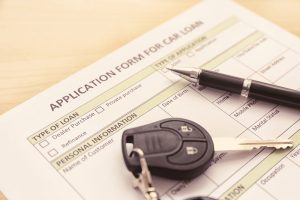
- The Savvy Promise
At Savvy, our mission is to empower you to make informed financial choices. While we maintain stringent editorial standards, this article may include mentions of products offered by our partners. Here’s how we generate income.
In this article
For car owners and potential buyers in Australia, the Personal Property Securities Register (PPSR) is an essential tool for protecting your financial interests. Whether you're buying a brand-new car from a dealership or a used car from a private seller, the PPSR can help you avoid unexpected surprises and navigate car purchases with confidence.
This guide dives deep into the importance of PPSR in the car space, explaining its functionalities and how it benefits car buyers and sellers.
What is the PPSR?
The PPSR is a national online register administered by the Australian Securities and Investments Commission (ASIC). It is a vital resource for businesses and individuals alike, recording security interests in personal property. This includes:
- Vehicles (cars, motorcycles, boats)
- Machinery and equipment
- Inventory (goods for sale)
- Investment assets (shares, jewellery)
- Intangible property (intellectual property)
The PPSR allows you to register a security interest, which essentially means you have a legal claim on a specific piece of personal property as collateral for a debt. This debt could be a loan, a lease agreement or a credit purchase.
Why is the PPSR important for cars?
The PPSR plays a crucial role in car transactions by providing transparency and protecting both buyers and sellers:
- Peace of mind for buyers: conducting a PPSR search before purchasing a car can reveal any outstanding security interests (loans, leases) on the vehicle. This means you'll be aware of any potential claims against the car before you finalise the purchase. Imagine buying a used car, only to discover later that the seller still owes money on it to a lender. With a registered security interest, the lender could potentially repossess the car, even if you've already paid for it. A PPSR search helps you avoid such situations.
- Protection for sellers: if you're selling a car with a loan outstanding, registering your security interest on the PPSR protects your financial stake. In the event the buyer defaults on the loan, the PPSR registration gives you the legal right to repossess the car to recover the debt.
How do I use the PPSR?
The PPSR system is user-friendly and accessible online. Here's how you can use it for car purchases:
For buyers:
- Conduct a PPSR search: before finalising a car purchase, visit the PPSR website and conduct a PPSR search for a small cost. You can search using the car's Vehicle Identification Number (VIN).
- Interpret the results: the search results will reveal any registered security interests on the car. These could be loans, leases or other financing arrangements. If there are outstanding interests, you'll need to understand the details from the seller before proceeding.
- Negotiate or obtain clearance: depending on the situation, you might negotiate a lower price with the seller if there are outstanding interests. Alternatively, you might require the seller to settle the debt and obtain a PPSR clearance certificate before completing the purchase.
For sellers:
- Register a security interest: if you're selling a car with a loan outstanding, you'll need to register your security interest on the PPSR. This protects your financial stake in case the buyer defaults on the loan.
- Provide a clearance certificate: once the loan is settled before selling the car, you can obtain a PPSR clearance certificate from ASIC. This document proves there are no outstanding security interests on the car, making it easier for the buyer to complete the purchase with confidence.
Additional tips for using PPSR for cars:
- Always conduct a PPSR search before buying a car, even from a trusted source.
- Understand the implications of any outstanding security interests revealed by the search.
- Don't hesitate to seek legal advice if you're unsure about any aspect of the PPSR process.
- Keep copies of the PPSR search results and any clearance certificates for your records.
Is the PPSR the same as a car history check?
A PPSR check and a car history check are both important for informing car purchases, but they serve different purposes:
- PPSR check: focuses on the financial history of a car. It reveals any outstanding security interests (loans, leases) registered on the vehicle. This is crucial because if there's a hidden loan on the car, the lender could repossess it even if you buy it from the seller.
- Car history check: provides a more comprehensive overview of the car's past. This can include:
- Registration history: number of previous owners and location history.
- Accident history: records any reported accidents or damage repairs.
- Odometer readings: helps identify potential odometer tampering.
- Registration status: ensures the car isn't stolen or scrapped.
- Service history: provides details on past maintenance and repairs (not always available).
A PPSR check is essential to ensure you're not buying a car with outstanding debt. A clean PPSR doesn't guarantee a perfect car, however. This is where a car history check comes in. By combining a PPSR check with a car history check, you get a more complete picture of the car.
By using the PPSR effectively, car buyers and sellers in Australia can navigate transactions with greater transparency and protection, ensuring a smoother and more secure car buying or selling experience.
While a PPSR check is a crucial step in buying a car, it's just one stop on your journey. After all the checks are done, it’s time to complete your purchase. If you need help with financing, Savvy is here to help. With our tailored car loan solutions and expertise in the automotive finance sector, we can guide you through the financing process, ensuring you secure the best loan option that suits your needs and financial circumstances. Get a quote today.
Did you find this page helpful?
Author
Adrian EdlingtonReviewer
Bill TsouvalasPublished on December 3rd, 2020
Last updated on March 12th, 2024
Fact checked
This guide provides general information and does not consider your individual needs, finances or objectives. We do not make any recommendation or suggestion about which product is best for you based on your specific situation and we do not compare all companies in the market, or all products offered by all companies. It’s always important to consider whether professional financial, legal or taxation advice is appropriate for you before choosing or purchasing a financial product.
The content on our website is produced by experts in the field of finance and reviewed as part of our editorial guidelines. We endeavour to keep all information across our site updated with accurate information.
Approval for car loans is always subject to our lender’s terms, conditions and qualification criteria. Lenders will undertake a credit check in line with responsible lending obligations to help determine whether you’re in a position to take on the loan you’re applying for.
The interest rate, comparison rate, fees and monthly repayments will depend on factors specific to your profile, such as your financial situation, as well others, such as the loan’s size and your chosen repayment term. Costs such as broker fees, redraw fees or early repayment fees, and cost savings such as fee waivers, aren’t included in the comparison rate but may influence the cost of the loan. Different terms, fees or other loan amounts may result in a different comparison rate.








